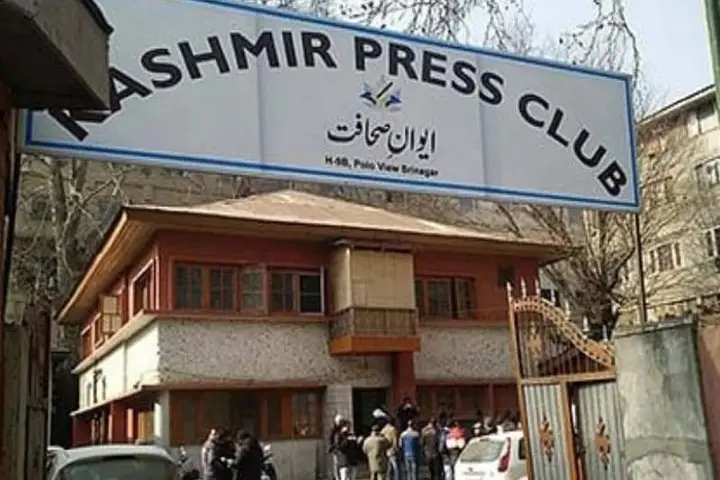Srinagar: At least five Kashmiri journalists have announced their resignation from their organisations following fresh terror threats to as many as 32 Srinagar-based mediapersons in the last three days.
Ironically, World media bodies, including Committee to Protect Journalists and Reporters Sans Frontiers, and almost all major newspapers have maintained silence on the issue.
“I announce my resignation from Reporter’s position and disassociation from Media House Rising Kashmir W.E.F from today 14 Nov 2022”, Srinagar-based journalist Jehangir Sofi tweeted in the evening on 14 November. He also posted his letter of resignation addressed to Editor-in-Chief of the English language daily Rising Kashmir.
Four more journalists associated with the same newspaper and other organisations have reportedly submitted their resignations on Tuesday.
The Resistance Front (TRF), which according to police officials is a front for the Pakistan-based terror organisation Lashkar-e-Tayyiba (LeT) released the first ‘hit list’ of 12 Srinagar-based mediapersons on its website ‘KashmirFight’ and its WhatsApp groups on 13 November. It included 6 journalists working with the valley’s largest-circulated daily ‘Greater Kashmir’, including its Editor-in-Chief Fayaz Ahmad Kaloo. Five of the remaining 6, were associated with the second largest circulated daily ‘Rising Kashmir’, including its Chief Editor Ayaz Gani Hafiz.
Owner and editor of ‘Rising Kashmir’, Hafiz is the brother-in-law of the prominent journalist and RK’s founder-editor Shujaat Bukhari who was gunned down in a major terror attack outside his office in Srinagar’s Press Enclave on 14 June 2018. Hafiz has been accused of hobnobbing with the Indian authorities and agencies and promoting the security forces’ narrative. Citing one of RK’s news stories, labelling Jamaat-e-Islami as a “terror organisation”, KashmirFight has raised questions over the integrity of journalists who had mourned Bukhari’s assassination.
In the second virtual hit list through the same medium on 14 November, TRF identified 10 journalists—including three each from GK and RK and two from ANN—as ‘stooges, agents and collaborators’ of the Indian Police, security and intelligence agencies.
Simultaneously another ‘hit list’ of 12 Srinagar-based mediapersons, which included 10 who have been known sympathisers of separatists and militants, appeared on an identical format in several WhatsApp groups. It also included GK’s consulting editor Emmad Makhdoomi who also figured in the first list. However, TRF disowned this list through its social media platforms, suggesting that it had been released by its rivals.
Around 20 Kashmiri journalists have been killed in different terror attacks after the eruption of militancy in 1989. Some of them belonged to the State Government’s Information Department. Those killed in 1990 included the Director of Doordarshan Kendra Lassa Kaul. Editor of the vernacular Urdu daily ‘Al-Safa News’ Mohammad Shaban Vakil was shot dead at his office in 1991. Video-journalist Mushtaq Ali was killed in a bomb blast in which then BBC correspondent Yusuf Jameel and prominent photojournalist Habibullah Naqash sustained critical injuries in September 1995.
While the investigating agencies have left probe in many of these assassinations inconclusive, charge sheets have been filed in a few cases. Local journalists are tightlipped over the whodunit, even as many of them believe and express privately that all but the one executed at BBC’s office were carried out by different separatist militant outfits. They believe that the attack at BBC’s office was planned and executed by the counterterror outfit Ikhwanul Muslimoon whose leaders Javed Shah and Kukka Parray were killed by the militants in two separate attacks in 2003.
Interestingly, neither the world media bodies nor the Indian Press associations have expressed any concern on the three terror hit lists released in the last three days. The media war on the new turf began when a group of the journalists, commonly associated with the government officers and agencies, captured the Kashmir Press Club in January 2022 which was subsequently closed down by the Union Territory Government.
FIRs were subsequently filed against a number of the journalists for their “pro-separatist slant” and allegedly working at the behest of the Pakistani agencies, separatists and terrorists”. In the same year, the UT government gained complete control over the local newspapers and news agencies, particularly the GK and the RK. Their paid advertisements were stopped and released only after they agreed to give “fair coverage” to the government, call the militants as ‘terrorists’ and block publicity to all separatist and militant organisations.
This particular development caused perceptible concern among the militants and the separatists as the same newspapers were used as the key propaganda platform for the so-called ‘Azadi’ for about 30 years.
Immediately after a threat was issued to some local journalists last week, the Kashmir Zone Police said that a fresh FIR had been registered. “Case registered against handlers, active terrorists & OGWs of terror out LeT & its offshoot TRF for online publication & dissemination of a direct threat letter to journalists & reporters based in Kashmir.
Official sources said around a dozen suspects have been rounded up by the police and are being questioned for their alleged links with TRF. “We have rounded up suspects for being over ground workers (OGWs) of TRF. The detentions are not exactly linked to threats against media houses,” said an officer.
BJP says such threats are unacceptable and no one should be allowed to target journalists. “Terrorists have touched new lows, which is against people and against the fundamental right of freedom of speech and expression,” RS Pathania, spokesman of the BJP, said.
In 2018-20, KF spearheaded a campaign against a number of the Kashmir-based journalists charging them with being ‘informers, advisors, agents and collaborators’ of the Indian agencies. However, none of them has been attacked after Bukhari’s assassination in 2018. Now this group has claimed to have compiled a list of 76 Kashmiri journalists, alleging that they were on payrolls of the Indian agencies. However, no proof of any journalist’s association has been given by these groups till date.




















